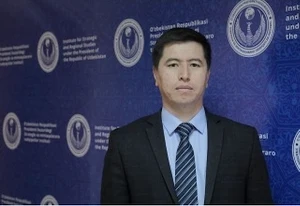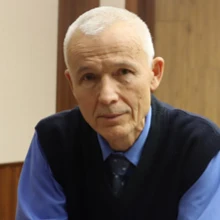In Uzbekistan, strengthening interethnic and interfaith solidarity is always a priority of state policy  Samariddin Sattorov,
Samariddin Sattorov,
Chief Researcher of the Institute for Strategic and Regional Studies under the President of the Republic of Uzbekistan
In recent years, geopolitical tensions have been increasing in different regions of the world, and interethnic conflicts and contradictions on religious grounds continue to worsen.
In the context of such instability, maintaining an open and constructive dialogue between different religious and cultural groups is becoming vital. Strengthening religious tolerance helps to create an atmosphere of mutual understanding, respect and generosity in society, which in turn alleviates tensions and prevents the escalation of conflicts. READ MORE
- Friday, 6 December 2024, 19:19
Uzbekistan exports its products to 115 countries  Export is a key driver of the economy, enabling the development of production, the creation of new jobs, and the growth of GDP. For this reason, every state seeks to support enterprises aiming to expand their exports to international markets. This article explores the comprehensive measures of direct support for exporters in Uzbekistan.
Export is a key driver of the economy, enabling the development of production, the creation of new jobs, and the growth of GDP. For this reason, every state seeks to support enterprises aiming to expand their exports to international markets. This article explores the comprehensive measures of direct support for exporters in Uzbekistan.
Export support in Uzbekistan is carried out systematically, strictly adhering to the goal set in the Uzbekistan 2030 Strategy — increasing the share of the private sector in exports to 60%.
Here are some indicative figures: from 2017 to 2023, Uzbekistan’s total exports reached $120 billion. In 2023 alone, export volumes amounted to $24 billion, marking a 64% increase compared to 2017.
READ MORE
- Sunday, 1 December 2024, 08:30
What the President of Uzbekistan regularly talks about with entrepreneurs of the country  Dilafruz Khusanova,
Dilafruz Khusanova,
Head of the Press Service of the Chamber of Commerce and Industry of Uzbekistan
Agriculture is one of the leading sectors of Uzbekistan’s economy.
The annual open Dialogue of President Shavkat Mirziyoyev with entrepreneurs, which has already become a tradition, once again gave impetus to new ideas and projects for representatives of all business categories. This year, discussions at the main platform in the world of Uzbek business took place on August 20 in Nukus. At the event, the Head of State announced new initiatives in five areas. READ MORE
- Monday, 4 November 2024, 16:48
“Green” development of New Uzbekistan and the fight against climate change  Lola Rakhmanbaeva,
Advisor to the Minister of Ecology, Environmental Protection, and Climate Change on Information Policy- Press Secretary
Lola Rakhmanbaeva,
Advisor to the Minister of Ecology, Environmental Protection, and Climate Change on Information Policy- Press Secretary
Agriculture is one of the leading sectors of Uzbekistan’s economy.
As a country with unique natural resources and rich cultural heritage, Uzbekistan is increasingly aware of the need for active action in the fight against climate change. The country is taking a number of measures and initiatives aimed at achieving sustainable and green development, which plays a key role in global efforts to mitigate the effects of climate change. READ MORE
- Friday, 25 October 2024, 14:07
Strengthening the rights of citizens in the area of freedom of receiving and disseminating information in the new Uzbekistan  Karine Javakova,
Karine Javakova,
Head of the Department of State and Legal Disciplines and Ensuring Human Rights of the Academy of the Ministry of Internal Affairs of the Republic of Uzbekistan, Doctor of Philosophy, Professor
Uzbekistan has created a solid legal framework to ensure freedom of speech and information, as well as the development of the media, improvement of the legal basis for the activities and protection of the professional rights of journalists. Considering that the liberalization of the information sphere and its development are priority tasks in the construction of the New Uzbekistan, after the constitutional reform, the articles devoted to these rights were significantly expanded. READ MORE
- Monday, 14 October 2024, 10:44
CERR: IMF Estimates Uzbekistan's GDP at $101.6 Billion  According to the IMF's assessment, the nominal GDP of the Republic of Uzbekistan in 2023 increased by 125.6 trillion sums ($10.7 billion) and amounted to 1,192.2 trillion sums ($101.6 billion). According to the IMF's assessment, the nominal GDP of the Republic of Uzbekistan in 2023 increased by 125.6 trillion sums ($10.7 billion) and amounted to 1,192.2 trillion sums ($101.6 billion).
CERR hosted a discussion among experts and academics regarding a study conducted by the Statistics Agency in collaboration with the IMF. The primary goal of this study was to assess the size of the unobserved economy in Uzbekistan and examine its impact on other macroeconomic indicators. READ MORE
- Monday, 5 August 2024, 09:56
A New and Technological Approach to Elections Begins  The Central Election Commission held a meeting and a series of events today, July 26th. The primary agenda item was the preparation and high-level accomplishment of the upcoming elections for the Legislative Chamber of the Oliy Majlis and the Councils of People's Deputies in full compliance with the Constitution and laws. The Central Election Commission held a meeting and a series of events today, July 26th. The primary agenda item was the preparation and high-level accomplishment of the upcoming elections for the Legislative Chamber of the Oliy Majlis and the Councils of People's Deputies in full compliance with the Constitution and laws.
According to Article 128 of the Constitution of the Republic of Uzbekistan, elections for the Legislative Chamber of the Oliy Majlis and the Councils of People's Deputies are scheduled to take place on the first Sunday of the third ten-day period of October in the year their term expires. Considering that the term of the deputies of the Legislative Chamber of the Oliy Majlis and the Councils of People's Deputies ends in 2024, the elections will be held on October 27th of this year, and the election campaign will begin on July 26th, as decided by the Central Election Commission. READ MORE
- Friday, 26 July 2024, 15:28
Uzbekistan plans to increase exports of electrical products to Europe, countries of South Asia and the Middle East  Yuri Kutbitdinov, Yuri Kutbitdinov,
chief Research Officer of the Center for Economic Research and Reforms under the Administration of the President of the
Republic of Uzbekistan
There are about a thousand manufacturing enterprises operating in the electrical engineering sector of Uzbekistan, most of them small, producing over two thousand types of products. Almost all enterprises in the industry are privately owned. The total number of people employed in the industry exceeds 35,000.
The 76 largest enterprises in the industry, which produce over 90% of all electrical engineering products, are members of the Association of Electrical Engineering Manufacturers (UzEltechSanoat). Of these, 18 enterprises manufacture electrical wires and cables, 27 enterprises manufacture household appliances, and 32 enterprises manufacture power transformers and other electrical products.
READ MORE
- Saturday, 20 July 2024, 08:13
|
|